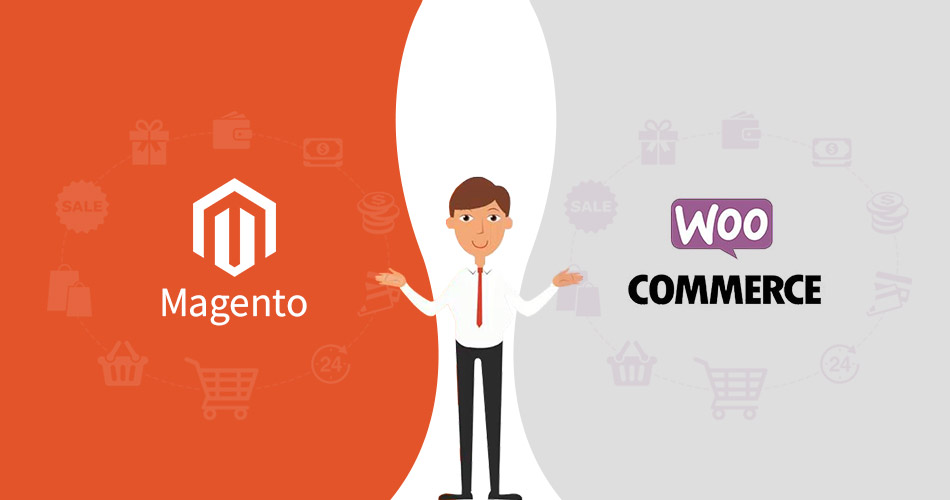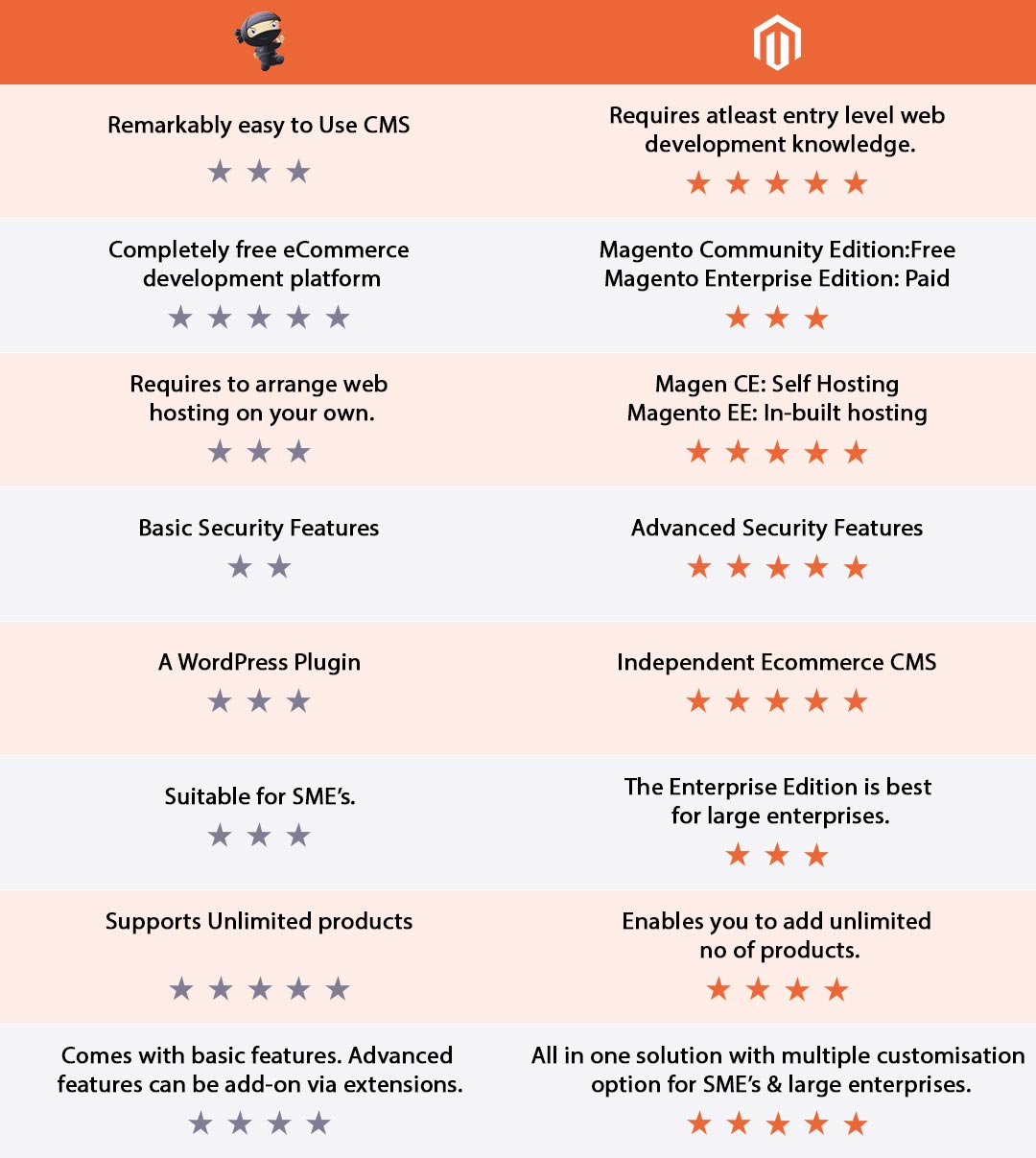
Are you planning to start your own eCommerce business? If your mind is struggling to choose between Magento Web Development and WooCommerce Development services, you’ve come to the right place. Choosing the right eCommerce platform for your online store is the first step towards the success of your online business. This article will help you in deciding the right CMS for your online store.
What you will learn from this article?
➤ Magento Vs WooCommerce: The Overview
➤ Important Aspects to look in an Ecommerce Platform
- Features
- Security
- Speed and Performance
- Role-based Admin Management System
- Payment Gateways
- Scalability
- Ease to use
- Cost
➤ A little bit about Magento Web Development
➤ Something about WooCommerce Development
➤ Magento VS WooCommerce: The Outright Comparison
➤ The Final Verdict
Magento Vs WooCommerce: The Overview
Looking at the market share of each eCommerce platform, Woocommerce is leading the market by 47.3% and Magento holds the second position with the market share of 13.1%. (Source: Wappalyzer, April 2017). Both of these solutions offer cutting edge features over the competitors, which makes them the leading players in the eCommerce software industry.
Important aspects to look in an eCommerce platform
Features
In this digital competitive world, your business needs a lot more than basic features to grow, meet and beat the competitors. Both the CMS’s offers a wide range of basic and advanced features but the one which offers great flexibility and more customization options is recommended most.
Magento: The Magento features allow you to build a fully-functioning advanced eCommerce store which is easy to customize as per your business requirements. You can also add various free and paid extensions/plugins available on the Magento marketplace to add rich functionalities to your web store. Also, you can integrate the Magento store to third-party applications, networks, and marketplaces, add advanced filter options, design an eye-popping online shop and so on. As far as features are concerned, Magento is the King!
WooCommerce: WooCommerce is a powerful plugin that converts a WordPress website to an eCommerce store. Although, WooCommerce also offers great features, highly customizable beautiful themes but because Magento CMS is fully dedicated to eCommerce business, it wins.
Who is the Winner?
Magento offers a comprehensive Admin panel which allows e-merchants with a vast array of features useful to manage the work and performance of the site. Magento can manage multiple storefronts with different domains from a single Admin Panel. Whereas such a great feature is not served by Woocommerce.

Security
With technological advancement, a large no of websites is getting hacked every day. An online store cannot afford to lose its valuable data. Both of these platforms offer advanced security measures. However, as Magento is an old and renowned company, it releases new versions and security patches now and then. Every upgraded version serves advanced security features. That’s why Magento succeeds in the security pie.

Speed and Performance
Despite the no of functionalities you offer to your store, if your store doesn’t load within 5 seconds, its definitely going to lose its customers and search earning rankings.
The speed and performance of a website usually depend on the web hosting provider, installed plugins and extensions and other external factors. If you are choosing Wooomeerce Development, you need to find your own host. And in the case of Magento Web Development, Magento Community (open-source) Edition is self-hosted and the premium version includes hosting.
In totality, both of these platforms are subject to external factors when it comes to performance and speed. That’s why there is a tie in this round.

Role-based Admin Management System
The Magento Web Development allows the Admin to assign users with distinguished role permissions. However, such a great feature is not supported by WooCommerce.

Payment Gateways
Both the Magento and Woocommerce comes with different payment options. WooCommerce comes with PalPal and Stripe. Through extensions and plugins, it is easy to extend the payment options in Woocommerce. Likewise, Magento comes with bank transfers, PayPal, Cash on delivery, and Authorise.net by default. Other popular payment gateways like Braintree, Google Checkout, WePay, Skrill, etc can be integrated via available extensions.
Both Magento and Woocommerce platform has support for multiple payment options and they both are great in terms of payment support.

Scalability
Is your store ready to handle 200% increased traffic during the Sale season? As a store owner, you should choose an eCommerce platform that is easy to scale as per business demands.
Although, Magento is a robust eCommerce platform. But when it comes to scaling, it requires huge cost and technicality. WooCommerce will also face technical challenges like Magento. But Woocommerce offers more options to grow your business while keeping the cost low. Hiring a WordPress specialist to scale your business is least expensive as compared to Magento. But a Woocommerce website has limits when it comes to scalability. On the other hand, Magento Websites are highly scalable.

Easy to Use
Undoubtedly, the winner is Woocommerce in terms of ease of usability.
Woocommerce is the best choice for beginners, for startup entrepreneurs. Even though you have no technical knowledge, it is easy to work with WooCommerce as compared to Magento.

Cost
Both Magento and Woocommerce are an open-source platform. That’s why, it is easy to start an online store with these platforms, without huge investments. But what’s free is not always great. Obviously, free things come up with limitations. Although Woocommerce is good for startup level stores, but it has certain limitations.
On the contrary, Magento’s Community Edition which is a free version offers great flexibility and features which help you to scale up your store hassle-free. Also, you can migrate your store built on Community Edition to Enterprise Edition if you plan to expand your business.
The cost incurred in migrating to Magento Enterprise Edition is worth as compared to the cost you may end up paying if you choose WooCommerce development.

A little bit about Magento Web Development
Launched over a decade ago, Magento is the most demanding eCommerce development platform across the globe. The core advantages of choosing Magento CMS is that it is highly secured, fully customizable, scalable, self-hosted, comes with the open-source platform as well as advanced Enterprise Edition. A Magento store can be integrated with third-party extensions, applications and marketplaces to offer multiple payment options to users, make logistics easier, enable Admin to manage thousands of products and orders without hampering the page load speed.
Top Websites using Magento Web Development (E-Commerce Websites)

Magento offers free edition for small enterprises, but the framework is challenging to learn for the one without technical knowledge. Magento Web development is the perfect choice for businesses with bigger plans and large online ventures. If you want to exploit the best features of Magento, you need to hire a Magento Specialist for building your online shop. And if your e-shop requires more advanced features, the various free and premium extensions can enrich the functionality of your e-store. With no shortage of funds, opt Magento Web Development Services and run a highly robust and secured online store.
Something about Woocommerce Development
WooCommerc runs on WordPress which is the leading website builder globally. The WooCommerce application is completely open-source and merchants can easily build their online shop with WooCommerce. It is an effective platform for small and medium-sized businesses. The store owners can add multiple plugins, customize the theme, add unlimited products and even scale the store if they want to grow their business. But in order to extend the business, more functionalities can be added via premium extensions. If you want to set up a small budget eCommerce business, WooCommerce development is a good option.
Top Websites using WooCommerce Development
Magento VS Woocommerce: The Outright Comparison

The Final Verdict
WooCommerce beats Magento in terms of ease to use and development cost of running an eCommerce website. But when it comes to flexibility, scalability and advances security, Magento overweighs WooCommerce. If you are looking forward to challenging Amazon and eBay or want to become another Amazon, the choice is clear.
We suggest you clear the below set of questions before you decide on the CMS for your e-business startup.
✔ What is your target Market? (National or international, any particular geographical region)
✔ How huge is your product range?
✔ How much minimum traffic do you expect on your website?
✔ Do you need a simple online store or complex store?
✔ What kind of online shop you are going to startup?
✔ What is your budget?
✔ Do you want to expand your business in the near future?
The decision of choosing the best eCommerce platform for your business totally depends on the business needs and requirements.
Which eCommerce platform did you finally select for your online store? Please share in the Comment Section below!

Good article!
Each e-commerce platform is good and Choose The Right CMS For Your Online Shop is decided only by your budget.
Shopify mostly attracts small and medium businesses, while Magento focuses on large enterprises that are interested in customization and flexibility.
If you have a large and scalable business, then you better choose Magento, although it is more difficult to set up, but it is more flexible and can cope with the display of a large number of products ten times faster. There is also built-in integration with payment systems and you can quickly place an order without even registering.
WooCommerce is a good plugin with its paid extensions, it’s easier to install, as the installation wizard is built into it. However, it is suitable for a small amount of goods, as no built-in filtering by product. You will have to pay for this functionality. Almost everything is tied to paid extensions. And in Magento, for example, more features are available on the free version.
If you have a very large business and want to reduce the speed of loading pages on your site, I advise you to take a closer look at the migration to Magento 2. Recently, many cool updates have been released for it, the security of this platform is also pleasing.
Another plus of these platforms is that they have a really large-scale community that will help you in solving any problem.